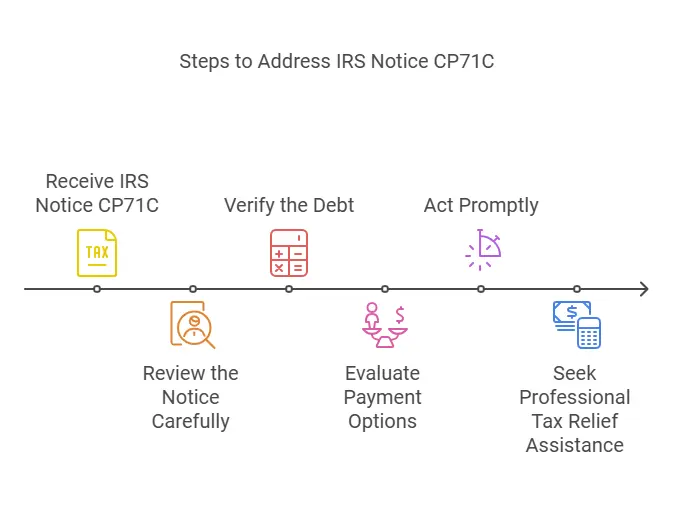Receiving a letter from the IRS can be stressful, especially if it’s about an outstanding tax balance. One such letter is IRS Notice CP71C, which serves as an annual reminder of your unpaid taxes. While it might not be a cause for immediate panic, understanding this notice and taking the appropriate steps is essential. As a tax relief company, we’re here to guide you through what this notice means and how to resolve your tax debt effectively.
What Is IRS Notice CP71C?
IRS Notice CP71C is an annual reminder sent to taxpayers who have an outstanding tax balance. It’s not a bill but a summary of what you owe, including any penalties and interest that have accrued. This notice is part of the IRS’s legal obligation to keep you informed about your tax debt.
Key Information Included in Notice CP71C:
- Outstanding Balance: A breakdown of the amount owed, including taxes, penalties, and interest.
- Payment Instructions: Details on how to make payments to the IRS.
- Potential Consequences: Information on actions the IRS might take if the debt remains unpaid, such as filing a tax lien or denying your passport.
- Contact Information: A phone number to reach the IRS for questions or assistance.
CP71C vs. CP171: Key Differences
While CP71C serves as an annual reminder of your unpaid taxes, CP171 is a more urgent notice demanding immediate payment. Ignoring CP171 can lead to more severe consequences, such as tax liens, levies, or other collection actions. If you receive CP171, it’s crucial to act quickly and seek professional assistance to avoid escalation. Don’t delay—contact our team to explore your options and protect your financial future.
Why Did You Receive IRS Notice CP71C?
You received this notice because the IRS’s records show you have unresolved tax debt. Here are some common reasons:
- Unpaid Taxes: You didn’t pay your full tax balance for previous years.
- Accruing Penalties: Interest and penalties continue to accumulate on your outstanding balance.
- Legal Obligation: The IRS sends this notice annually as a reminder.
Steps to Take When You Receive IRS Notice CP71C
Receiving this notice is a reminder to take action, but it’s not an immediate threat. Here’s what you should do:

1. Review the Notice Carefully
- Ensure the information matches your records.
- Check the balance and verify any penalties or interest.
2. Verify the Debt
If you believe there’s an error, gather your tax documents and contact the IRS to clarify. Mistakes can happen, and resolving discrepancies early can save time and stress.
3. Evaluate Your Payment Options
The IRS offers several ways to resolve your tax debt:
- Full Payment: Paying the entire balance stops penalties and interest.
- Installment Agreement: Spread payments over time in a manageable way.
- Offer in Compromise: Settle your debt for less than the full amount if you qualify.
- Currently Not Collectible (CNC) Status: Temporarily halt collection actions if you’re experiencing financial hardship.
4. Act Promptly to Avoid Further Consequences
Ignoring this notice can lead to more severe actions, such as tax liens, wage garnishments, or passport denial.
5. Seek Professional Tax Relief Assistance
Navigating IRS processes can be complex. Our team specializes in resolving tax debt through tailored strategies that align with your financial situation. Let us help you set up a payment plan, negotiate an offer in compromise, or explore other solutions to resolve your debt.
Why You Shouldn’t Ignore IRS Notice CP71C
While Notice CP71C itself doesn’t authorize immediate collection actions, it’s a clear signal that the IRS expects action on your part. Ignoring it could lead to escalating penalties, interest, and potentially severe consequences like tax liens or levies.
Take Action Today
If you’ve received IRS Notice CP71C, don’t face it alone. Our experienced tax professionals are here to guide you through the process and find the best resolution for your situation. Schedule a free consultation with us today and take the first step toward resolving your tax debt and regaining financial peace of mind.
Frequently Asked Questions
Notice CP71C is an annual reminder sent by the IRS to inform taxpayers about their outstanding tax balance, including penalties and interest.
“CP” stands for “Computer Paragraph,” indicating the notice was generated automatically by the IRS’s computer system.
CP171 is a more urgent notice demanding immediate payment. Ignoring CP171 can lead to more severe consequences, such as tax liens, levies, or other collection actions.
The IRS may ask for identity verification to ensure the security of your tax account and prevent fraudulent activity.
Authentic IRS notices will include your full name, a tax identification number (partially masked), and detailed instructions for payment or further action. Verify the notice by visiting the IRS’s website or calling the number listed on the notice.
The notice date is the date the IRS issued the letter. It’s important because certain deadlines for responding or making payments are calculated from this date.







